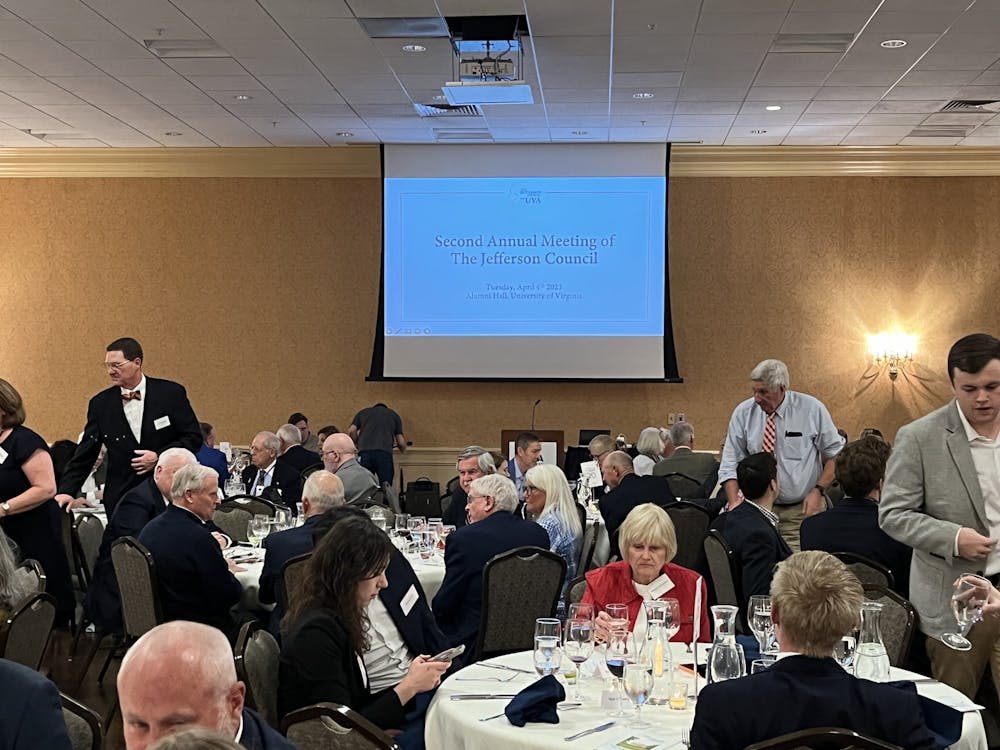In its latest attempt to counteract change at the University, the Jefferson Council held its second annual meeting with several speakers and group members in attendance. The meeting discussions ranged from topics like diversity, equity and inclusion practices and affirmative action to “woke” culture at the University. The Council, led by Bert Ellis, Board of Visitors member and Darden Alumnus, was formed to protect the oldest traditions of the University — namely preserving Thomas Jefferson’s legacy and the Honor system.
In theory, the Council’s objectives are not inherently threatening. The University too strives to protect Jefferson’s legacy and the Honor Committee — through celebration but also through reform. But the Council’s refusal to acknowledge the faults of the University’s oldest traditions, and how those practices have consistently harmed marginalized groups, shows that the group is out of touch with our values as a community. Simply put, a council that antagonizes meaningful attempts to honestly reckon with our horrific legacy of racism has no place on our Grounds. This is a warning for students — we must resist the Jefferson Council’s agenda.
The choice of speakers for the event highlights the sort of problematic rhetoric that the Council deems acceptable. One prominent speaker chosen to give remarks at the event was Brown University professor Glenn Loury, known for his conservative stances on issues like affirmative action. Loury began his speech by acknowledging that the topics at hand were sensitive, but did not exactly approach the topics in a sensitive manner. One of Loury’s most controversial takes is that the circumstances of Black Americans who are not well-off today are the result of their own failures to take advantage of 20th century developments in civil rights. At one point, Loury’s outlandish takes solicited a response from an audience member who said if he had to choose a doctor and only knew their race, he would not choose a Black doctor. These racist comments were not exactly shut down by Loury, who believes that white supremacy is a narrative put forth by the left and is a departure from reality, suggesting that institutional racism is not widespread today.
If these comments sound controversial and contrary to University values, it is because they are. Attending this University is a constant reminder of its storied past — a past that features great feats but also tragic failures, like the institution of slavery and the Honor system’s historic discrimination against minority students. Despite these failures, the University has continued to progress forward. Just this semester, students voted by an overwhelming majority to overhaul the Honor system by implementing a multi-sanction constitution, the single biggest change the Committee has seen since its inception. Bert Ellis has a history of vocally opposing proposed changes from students, specifically saying he is ready for a “fight” to save Honor. Acknowledging and remedying the negative effects left by centuries of racism in our institutions is a task students have taken upon ourselves because we care to leave our school better than we found it. The Jefferson Council continues to espouse an agenda that is antithetical to this progress. They characterize our efforts as a wokeness that needs to be stopped, displacing our viewpoint in favor of their own.
The Jefferson Council knows they are out of touch with the values of this community. At the meeting, members of the Council behaved as if they were a rebel group that could only discuss these issues in private. Again, Loury even began his speech by acknowledging that he was being recorded and that the issues at hand are sensitive, but said to the crowd, “Y’all are my people.”
Despite the disconnect, it is wrong to say that the Jefferson Council is all talk, no action. The startling views of those on the Council have proven to be exceptionally dangerous given members' choice to force their ideology onto students. As we have seen already, members like Ellis have penetrated our governing bodies with agendas of combating changes they see as too “woke.” Even relatively common practices like DEI initiatives — intended to remove barriers caused by centuries of institutional racism — are too much for those on the Council to stomach. If we allow the Jefferson Council to undermine the University’s values as they assume positions of power, we risk repeating the racist history we are fighting to redress.
Not only are the Jefferson Council’s views desperately out of touch, they have the potential to harm the culture of progress that students have created on Grounds. The council’s blog shares daily posts that have criticized the University’s “woke mob,” “left-wing brainwash” and even frequently responding to coverage from the “militant leftists” at The Cavalier Daily. What the Council fails to understand is that discussing our faults to create a better future is not left-wing brainwash — it is progress. By examining our historical wrongdoings, we are moving towards a future that can appreciate both the legacy of Jefferson and acknowledge the remarkable progress that we have made to fix our wrongdoings. This progress is in pursuit of a better future for all that attend the University — and if the Jefferson Council continues to fight against that better future, we students must not let them.
Ford McCracken is a Senior Associate Opinion Editor for The Cavalier Daily. He can be reached at opinion@cavalierdaily.com.
The opinions expressed in this column are not necessarily those of The Cavalier Daily. Columns represent the views of the authors alone.







